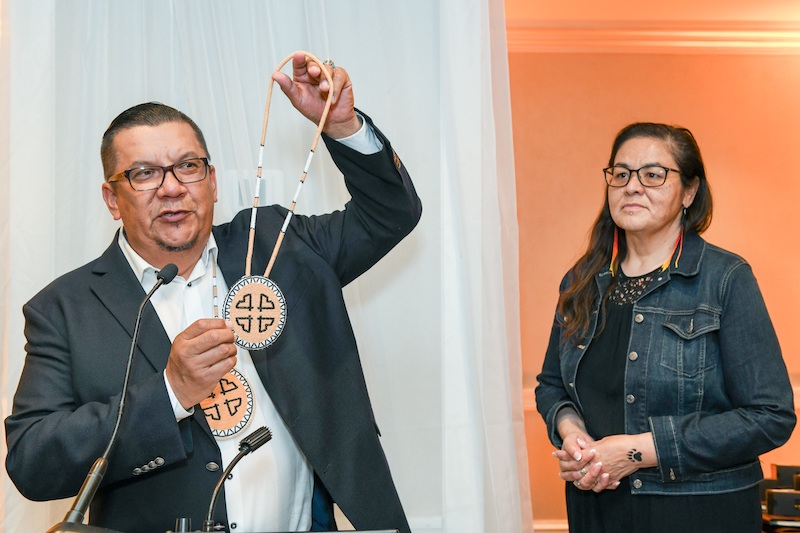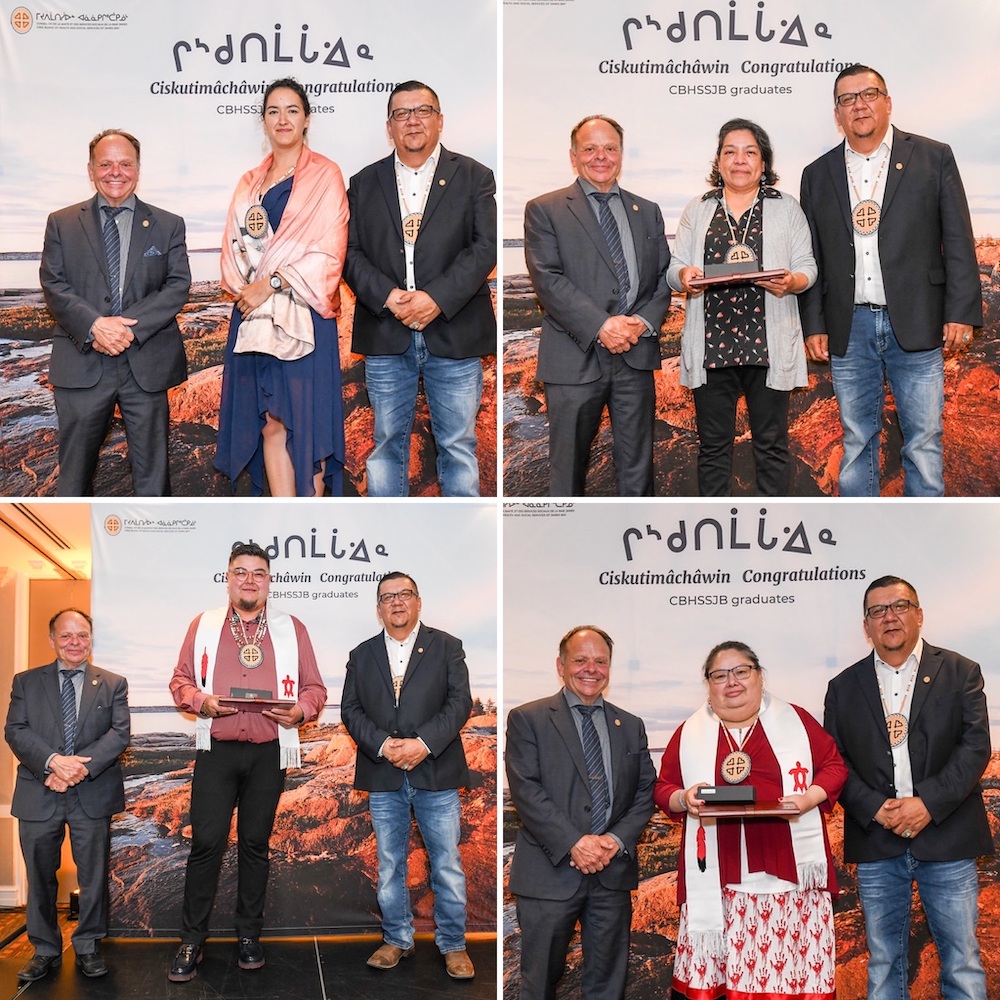As graduation ceremonies were being planned at schools throughout Eeyou Istchee, two events in early June celebrated milestones in Cree post-secondary education that leveraged online resources to enable students to advance their studies close to home.
On June 8, 15 Cree teens marked their completion of the inaugural Iyeskuwiiu springboard program at John Abbott College near Montreal. The next day, the Cree health board commemorated 35 employees who recently finished a range of university programs as part of its Talent Development Program, intended to nurture future leaders in the organization.
The Iyeskuwiiu Springboard to DCS program was developed specifically for Cree students through close consultation with Cree Elders, educators, students and subject-matter experts. Cree School Board leaders said the completion of this first cohort is an important milestone in the Cree Nation’s pursuit of in-community post-secondary education.
“The content is informed by the expertise of our people, and it is offered to students in their home communities,” explained Sabtuan Adult Education Services Director Nian Matoush. “John Abbott has shown an immense respect for the perspectives of our people. This type of collaboration shows what reconciliation can look like, reclaiming and reframing education in the Eeyou or Eenou way.”
The unique one-year program enables students to acquire CEGEP prerequisites and valuable study and life skills that support their often-challenging transition to schools in the South. Mistissini student Ethan MacLeod appreciated this customized in-community education after earlier dropping out of college in Ottawa.

“Everybody was in isolation, so I was completely alone plus I was not doing well mentally,” MacLeod shared. “This program changed everything for me. What I take away from this program is initiative, leadership and responsibility. That’s going to help me when I continue my studies.”
With a newborn bab, MacLeod is glad he could spend this time near his family and friends. He enjoyed deepening his knowledge of the Cree culture and way of life, particularly during the land-based physical education component, which was the only time the students from seven different communities could meet prior to the convocation.
“It was not like anything I’ve ever experienced,” MacLeod told the Nation. “I’m very grateful for sharing that with people from other communities who don’t have the opportunity to go out on the land. I was shown how to trap, gut and skin beaver, which I won’t forget because my girlfriend loves beaver.”
Matoush said that reinforcing Cree identity through these types of courses builds students’ self-confidence, which empowers their transition to studies beyond Eeyou Istchee. At the ceremony, she declared this initiative was an “extremely meaningful step towards a Cree-centred post-secondary education that many of us in the Cree Nation have dreamed about.”
CSB chairperson Sarah Pash said the program is part of capacity building and self-determination. She described her own education journey, and credited her mother’s fierce devotion for helping her finish high school after having dropped out.
“She actually took a leave from her work and decided I would be her job,” Pash recalled. “I learned what the support of family can do when our young people are getting where they want to be. Whatever happens along the way, there will always be people to support you – you have all of us behind you.”
Pash referenced former Grand Chief Billy Diamond, who would tell young people they have leadership within themselves, and that it was their responsibility to discover what that leadership was.
During a June 9 graduation event in Montreal, the Cree health board celebrated future leaders who completed the Talent Development Program. The initiative to advance Cree employees into management roles is part of the larger Cree Succession Leadership Framework.
Cree Board of Health and Social Services of James Bay (CBHSSJB) employees also completed these programs online in their own communities. Beginning in 2016, 33 Cree students followed health and social services management programs from McGill University and other educational partners.
“We have a crucial role to play in preparing the path of succession for the generations to follow,” explained graduate Nicholas Ortepi, a specialized IT analyst and the board representative for non-clinical staff. “It is our sacred obligation to make decisions that are based around creating and protecting opportunity for our youth. We need to mentor them, to ensure they are prioritized for hiring.”
For grads like Rachel Martinhunter, it was a far more positive experience than moving to Gatineau for college a decade ago with her father and two young sons. Martinhunter’s additional education has already resulted in being promoted to coordinator of federal programs and services – 22 other graduates in the group have also earned promotions so far.
“I was able to stay connected with my culture,” Martinhunter told CBC. “I was able to practice my culture. I was able to go to the bush.”
As gatherings were limited by the pandemic, the celebration combined graduates from several years, including 20 who completed certificates and 13 who completed diplomas in a range of university programs through evening and weekend classes. Daniel St-Amour, CBHSSJB executive director, said that having more Cree representation in management would have beneficial impacts throughout the organization’s services.
“I see the future leader of the Cree health board in this room,” said St-Amour, who has said he hopes to be the board’s last non-Indigenous executive director. “You are the future of this organization. How proud I am of all of you.”
The event also commemorated Helen Belanger Shecapio-Blacksmith, who received her master’s in public administration in an Indigenous context from the École nationale d’administration publique, and her cousin Nancy Shecapio-Blacksmith, who earned a bachelor’s in integrated nursing from McGill.
All graduates received beaded medallions made by Vivian Jerome, home-made treats backed by CBHSSJB clients in Montreal and professional portraits. Entertainment was provided by fellow graduate Deanne Moore along with bands Scott-Pien Picard, Maten and Ninan.
“It feels good, like the future of your organization is in good hands,” said CBHSSJB chairperson Bertie Wapachee. “The dream is to make this organization the most progressive Indigenous health and social services organization in the country, but also the world.”


by Patrick Quinn, Local Journalism Initiative Reporter





